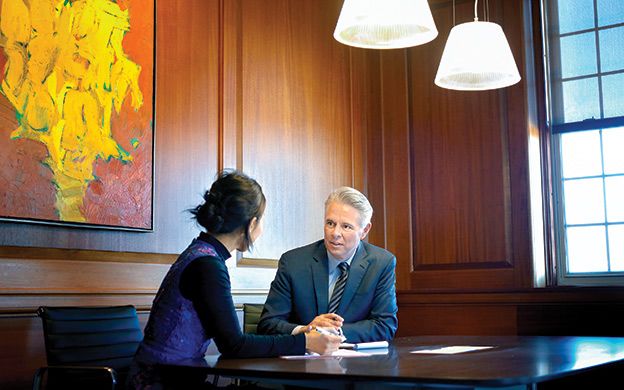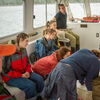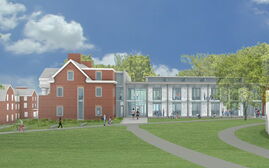Unifying 'town' and 'gown': Colby College President David A. Greene spearheads $65M investment effort
Before his official inauguration as president of Colby College in July 2014, David A. Greene accepted the college's board of trustees' invitation to attend a committee meeting on admissions and financial aid. Asked toward the end of the meeting what he thought about the number of applicants to the elite school — 5,000 at the time — he replied, “Your ambition is not in the right place. You should have 10,000.”
“Eyes rolled. But then he ripped through a number of ways to go about it,” recalls Robert Diamond, the former chair of Colby's board who hired Greene. “His first year he increased applicants 60% and the second year there were more than 10,000.” Greene accomplished that by changing the college's culture and attitude about admissions, says Diamond, and he recruited talented people to transform the way the school went about bringing in top students.
Diamond says he personally had a lot on the line to pick the correct successor to William Adams, who had been president since 2000. The selection committee started with 300 applicants, pared it to under 100 and then interviewed 30 intensively.
“The biggest first impression of David for me was he had written to us with an incredible piece on the value of a good liberal arts education,” Diamond says. “He truly understood what it took to be successful at a small liberal arts college.”
The only concern among Diamond and his fellow trustees was that Greene had big ambitions and a broad plan to become an anchor institution to help make Waterville a destination city in which the school and the college intersected, where arts and restaurants would draw tourists from all over. The town, afterall, had helped Colby survive several cycles when money was tight. It was time to pay it back, and Greene had made similar transformations as executive vice president at the University of Chicago and its Hyde Park neighborhood and as a vice president at Brown University in Providence. Early on, Greene had big plans for little Waterville, including a downtown dormitory and boutique hotel.
“A number of the trustees said, 'You realize this will require more ambitious fundraising,'” Diamond says. Their fears about whether he could attract the money were quickly allayed.
By October 2015 Colby had purchased four downtown Waterville buildings to rehab, and continued buying buildings. In October 2015 the Harold Alfond Foundation and Colby each ponied up $10 million for Waterville's revitalization. In February 2017 philanthropists Peter and Paula Lunder gave $100 million to the college's art museum and real estate executive and Colby graduate Joe Boulos and his wife Sheri donated $10 million toward the new athletic center.
In all, Greene estimates, the entire Main Street Waterville project will require some $65 million in investment from all sources, including private developers, over the next five years. And he's currently raising more money for on-campus projects like the athletic center.
Learning from each conversation
Alumni, businesspeople, local government and foundations all have supported his master plan for Waterville. But that's not always the case when the Ivy Tower descends into the local neighborhood, sometimes causing fear or resentment. Those who know Greene say he succeeds because he is humble, listens, isn't afraid to hear differing opinions and learns from interactions.
“He talks to everyone,” says Robert Zimmer, president of the University of Chicago, who worked with Greene there and at Brown. “If you talk to people and listen to them, there's a tremendous amount to learn from each conversation. He quickly gets attuned to the culture of the university and the ways people need to interact within that culture. He's a person of genuinely unusual skills, ambition and work ethic.”
Leslie Biddle, a partner at Serengeti Asset Management in New York City who also is vice chair of Colby's board and a member of the selection committee, agrees. “He is a real visionary,” she says. “He sees things from different angles and he can communicate his vision in a meaningful way for how different shareholders would see it.”
She says he has the family genes for being a college president. His father Richard was president of St. Thomas University in Miami and Goddard College in Vermont. His brother Tom is president of the Vermont College of Fine Arts in Montpelier. Greene's other siblings include a lawyer and international banker. His parents met at college and have seven children. Greene and his wife Carolyn have three children, one of whom attends Colby.
“My parents were part of the Depression era,” says Greene. “Our mantra was, 'Education is the one thing they can't take away from you.' My parents showed me that education is the way to a new life.” Greene holds a bachelor's degree in history from Hamilton College and three graduate degrees from Harvard University.
Ironically, it was only after he became president of Colby that Greene discovered his mother, Dolores, had wanted to apply to Colby in the 1950s, but told him she had no financial resources to do so.
“One of the first things I did at Colby was to add $5 million to the financial aid budget, which helped 500 students. It made a big difference. In Maine that kind of commitment is big,” he says. He didn't want students to look at Colby like it was aspirational, but not available. Now, 12% of Colby's 2,000 enrolled students are from Maine.
Piggybacking that effort to open opportunities to students is an in-progress Center for Discovery, Global Impact and Achievement, for which Greene still is seeking a contributor who would like their name on the building. The idea is to give students experience in internships, one or more global experiences and the chance to do research, so they are engaged in their coursework and the world.
Greene respects the cost of an education and the sacrifices students make to come to a school like Colby, and says he wants to increase the life chances of its students.
“I tell them, 'Congratulations on getting here. You did extraordinary things. Now forget all that. All the hoops you jumped through to get here are no longer relevant in your life,'” he says. “I tell them to stop having an external rewards drive and focus on doing things for themselves, to think entirely differently and push themselves in new ways.”
Big ideas
What worries Serengeti's Biddle at times is that Greene may become too tired. He is seen regularly about campus at student arts and athletic events, donned in the school's blue and grey colors, in addition to meeting with all the constituents of the downtown Waterville revitalization and the campus expansion. But talking at an end-of-day meeting recently, he looks energetic and attentive to the conversation at hand, at the same time relaxed and creating a comfortable environment for those around him.
“David is very present on campus. There may be two to three different David Greenes. He's ubiquitous,” says Alexander “Sandy” Buck, a Colby grad and head of the Horizon Foundation, who also made a multimillion-dollar donation last December to fund the Buck Environment and Climate Change Lab, which will give students research and internship opportunities.
One of Greene's pet projects is the $200 million Colby College Athletic Center, which is in the design phase now and which could almost triple the space for exercise, fitness and sports activities. That building also needs a major donor, Buck says.
Buck says Greene's enthusiasm inspires him.
“I never expected to give money to move the dial on environmental studies,” he says. “Greene inspires people to be more than they [think] they can be.”
Adds Buck, “He said in his inaugural address, 'This is Colby's moment. This is Colby's time.' He hasn't taken his foot off the gas since.”
Unifying 'town' and 'gown'
Buck adds that he is excited about what Greene has done to unify the “town and gown” divisions, moving the downtown revitalization ahead.
Eric Rosengren, president and CEO of the Federal Reserve Bank of Boston, is a Colby graduate and chairman of its board. He quickly saw the potential Greene had to boost Waterville. “The Boston Fed actively thinks of how to get communities that aren't accelerated to progress in ways others have,” he says. “One of the things with David is he is clear about accelerating progress with Colby and Waterville.”
He points to winterizing of the softball and baseball fields and pulling in investment in the art museum as examples of Greene's successes. The art museum attracts 50,000 visitors annually.
“The synergies between the school and the city were strong and David saw that,” says Rosengren. “He is extremely collaborative in working with businesses and state and local government. You have to make sure everyone is on board.”
He adds, “Taking on the Waterville project isn't necessarily something a new university president does. But he had experience at the University of Chicago and he's brought in an extremely strong management team.” He adds that Greene found a way to expand the pie of funding rather than just reallocating resources.
Greene says he believes there is potential for the Waterville plan to be replicated in other parts of the state. He'll be speaking soon at a conference at law firm Goodwin Procter's Boston headquarters about how an anchor institution can play an economic development role.
He and his brother Tom also are collaborating on an op-ed piece about the arts.
When he finally slows down, Greene says he'd like to write some long-form journalism stories. And that would bring him full circle into the profession of his first job, that of a paperboy.
Read more
2017 Business Leaders of the Year
Colby College: Downtown Waterville investment 'already paying off'
















Comments